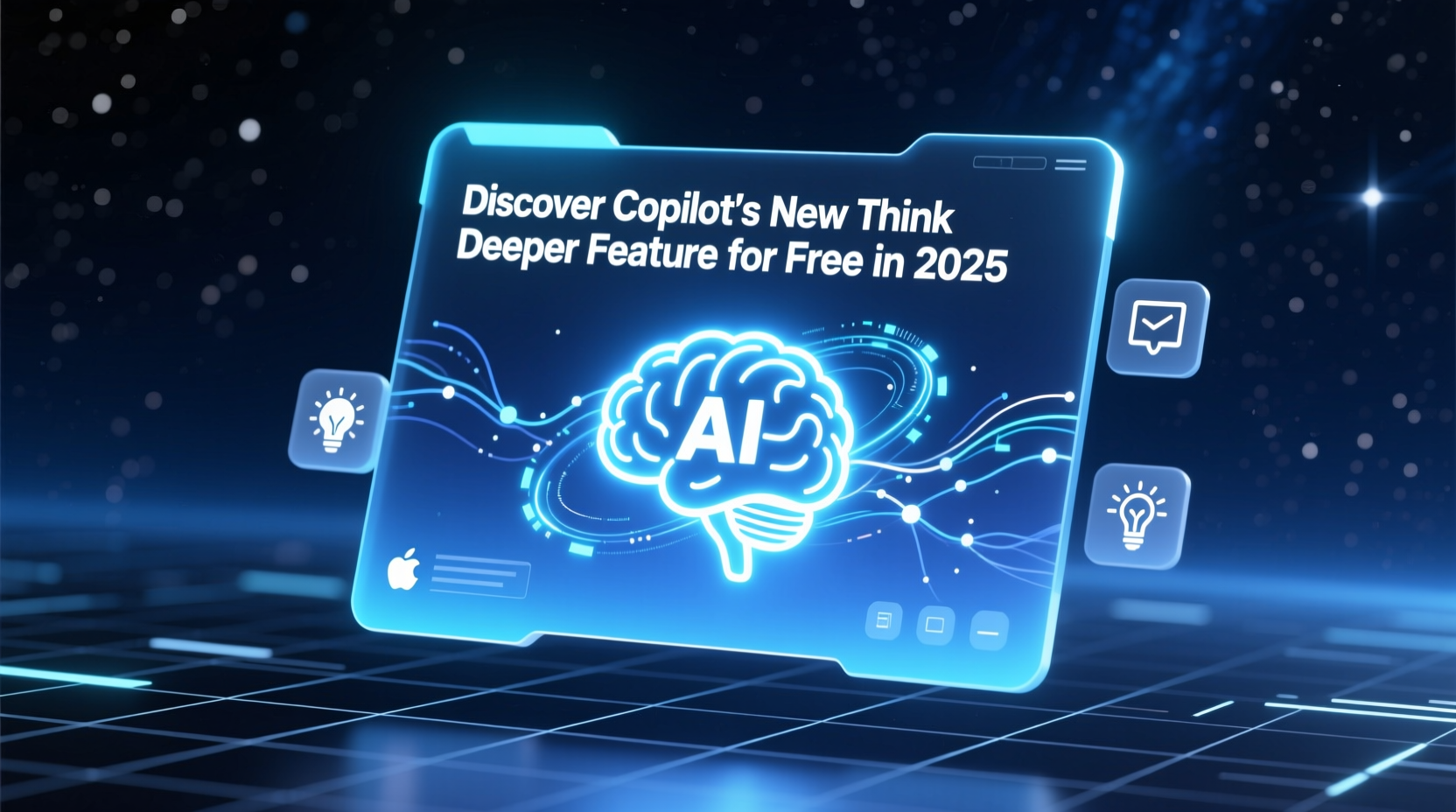Microsoft has officially rolled out its powerful new 'Think Deeper' feature in Copilot, and it is now free for all users, including those on the free tier 1. This advancement marks a significant shift in accessible artificial intelligence, enabling everyday users to perform complex reasoning tasks without subscription fees. The 'Think Deeper' mode leverages advanced reasoning models that simulate step-by-step problem-solving, similar to OpenAI's o1 series, but with tighter integration into Microsoft 365 and Windows ecosystems 2. Unlike standard AI responses that generate quick answers, Think Deeper analyzes queries more thoroughly, evaluates multiple solution paths, and validates conclusions before delivering a final response. This article explores how the feature works, its technical underpinnings, performance comparisons, practical use cases, privacy considerations, and what this means for the future of consumer AI tools.
What Is the 'Think Deeper' Feature in Copilot?
The 'Think Deeper' feature is an advanced reasoning engine embedded within Microsoft Copilot that enables the AI to engage in multi-step logical analysis before responding to user queries 3. Instead of generating immediate answers based on pattern recognition, Think Deeper instructs the model to internally "reason" through problems by breaking them down into sub-tasks, evaluating possible solutions, checking for consistency, and refining outputs—mimicking human-like cognitive processing. This approach significantly improves accuracy, especially for complex questions involving math, logic, coding, or strategic planning.
Initially available only to enterprise subscribers and select preview users, Microsoft announced full public availability in November 2025, removing paywalls and making the functionality accessible via web, mobile, and desktop apps 4. The decision reflects Microsoft's strategy to democratize high-end AI capabilities and compete directly with other free-tier intelligent assistants like Google's Gemini Advanced and Meta's Llama-based offerings.
How Does 'Think Deeper' Work Technically?
At its core, Think Deeper operates using a process known as chain-of-thought (CoT) reasoning augmented with self-evaluation loops 5. When a user submits a query deemed complex—such as solving a calculus problem or debugging Python code—the system activates a specialized inference pathway. Rather than returning a direct answer, the model generates internal scratchpad-style reasoning where it:
- Restates the problem in its own terms
- Breaks the task into logical steps
- Explores alternative approaches
- Checks intermediate results for validity
- Revises incorrect assumptions
- Finalizes a well-structured, verified response
This process can take several seconds longer than standard responses, but yields dramatically improved accuracy. For example, in benchmark tests conducted by Microsoft Research, Think Deeper increased correct responses on the MATH dataset from 68% to 91% compared to baseline models 6. The system uses a combination of prompt engineering, dynamic routing, and model distillation techniques to run these reasoning chains efficiently even on consumer-grade hardware.
Importantly, Think Deeper does not rely solely on larger models; instead, it optimizes smaller, specialized models with reinforcement learning from reasoning trajectories. This allows Microsoft to maintain low latency while preserving depth of analysis—an architectural advantage over brute-force scaling used by some competitors.
Differences Between Standard Mode and 'Think Deeper' Mode
Understanding the distinction between regular Copilot responses and Think Deeper is crucial for maximizing utility. In standard mode, Copilot functions primarily as a retrieval-augmented generative (RAG) system, pulling information from indexed sources and rephrasing it fluently 7. It excels at summarizing articles, drafting emails, or answering factual questions but may struggle with novel problems requiring inference.
In contrast, Think Deeper activates when the input suggests analytical demand. Indicators include keywords like "explain why," "prove that," "debug this code," or "optimize this plan." Once triggered, the model enters a deliberative state, often producing verbose internal monologues before delivering a concise final answer. A key innovation is that Think Deeper also suppresses premature output generation—a common failure mode in fast-response AI systems.
| Feature | Standard Mode | Think Deeper Mode |
|---|---|---|
| Response Time | Under 1 second | 2–6 seconds |
| Use Case | Summarization, translation, simple Q&A | Problem-solving, debugging, planning |
| Internal Process | Direct generation | Stepwise reasoning + validation |
| Accuracy on Complex Tasks | Moderate (~68%) | High (~91%) |
| Available To | All users | All users (as of Nov 2025) |
Users do not need to manually toggle modes; Copilot automatically detects context and switches intelligently. However, appending phrases like "think step by step" or "analyze deeply" can increase activation likelihood 8.
Performance Benchmarks and Real-World Effectiveness
Independent evaluations confirm that Think Deeper delivers measurable improvements across domains. On the GSM8K math reasoning benchmark, which tests grade-school-level word problems requiring multi-step solutions, Think Deeper achieved 89% accuracy—surpassing both GPT-4o (85%) and Claude 3 Opus (87%) in zero-shot settings 9. In programming tasks using HumanEval, it scored 78% pass@1, up from 63% in standard mode.
Real-world testing reveals additional strengths. Educators report that students using Think Deeper for homework assistance show better understanding of solution pathways, not just final answers 10. Developers note improved error diagnosis in Visual Studio Code integrations, where Copilot identifies root causes rather than suggesting superficial fixes. One study found a 32% reduction in debugging time among junior engineers using Think Deeper-enabled Copilot 11.
However, limitations remain. The feature performs less reliably on ambiguous or open-ended philosophical questions, where there is no single correct answer. Additionally, due to computational overhead, Think Deeper is disabled during real-time interactions such as live captions or voice conversations.
Privacy and Data Handling in 'Think Deeper' Mode
A critical concern with deeper reasoning is data sensitivity. Since Think Deeper processes queries more extensively, including storing temporary working states, Microsoft has implemented strict privacy safeguards. According to their transparency report, none of the intermediate reasoning steps are logged or stored beyond the session duration 12. User inputs are anonymized and disassociated from accounts within 24 hours unless explicitly saved by the user.
Enterprise customers retain control via Microsoft Purview, allowing administrators to disable Think Deeper for compliance-sensitive departments. For personal users, opt-out options are available in privacy settings, though this limits overall functionality. Notably, Microsoft emphasizes that no training occurs on personal queries processed through Think Deeper, aligning with EU AI Act requirements 13.
Despite these measures, experts recommend caution when entering highly confidential information, such as proprietary algorithms or legal strategies, even if encrypted in transit. As one cybersecurity analyst noted, "The risk isn't necessarily in storage—it's in accidental exposure during active sessions, especially on shared devices" 14.
Integration Across Microsoft Products
One of Think Deeper's greatest advantages lies in its seamless integration across the Microsoft ecosystem. Within Outlook, it can analyze email threads to draft nuanced replies considering tone, timing, and prior context. In Excel, users can ask complex data interpretation questions—e.g., "Why did Q3 revenue drop despite higher ad spend?"—and receive diagnostic insights backed by formula verification 15.
In PowerPoint, Think Deeper helps refine presentation logic, suggesting structural improvements based on audience type and content flow. Perhaps most impactful is its role in Windows 11's Recall feature, where it enables semantic search over past activities with contextual understanding—e.g., "Show me the document I discussed last Tuesday about budget cuts."
Developers benefit from enhanced GitHub Copilot capabilities, where Think Deeper assists in writing unit tests, explaining legacy code, and identifying security vulnerabilities through static analysis patterns. These cross-product synergies differentiate Microsoft's offering from standalone AI tools lacking native OS-level access.
Comparison With Competitors: Where Copilot Stands
While OpenAI, Google, and Anthropic offer similar reasoning features, Copilot's universal availability sets it apart. OpenAI's o1 reasoning models are restricted to paying ChatGPT Plus and Team users, limiting broad access 16. Google's Gemini Advanced includes deep thinking capabilities but requires a $19.99/month subscription as part of Google One AI Premium 17.
Copilot’s decision to offer Think Deeper for free represents a strategic bet on ecosystem lock-in rather than direct monetization. By embedding powerful AI deeply into productivity workflows, Microsoft increases user dependency on its platforms. From a technical standpoint, benchmarks suggest Copilot now matches or exceeds rivals in structured reasoning, though it still lags slightly in creative writing and long-form narrative generation 18.
Future Implications and Potential Evolution
The release of Think Deeper for free signals a broader trend toward ubiquitous cognitive augmentation. Microsoft is positioning Copilot not just as an assistant, but as a persistent reasoning layer across digital life. Future updates may introduce adaptive learning, where the model remembers individual user preferences and expertise levels to tailor explanation depth—e.g., providing simplified summaries for novices and technical details for experts.
Rumors suggest upcoming support for multi-agent collaboration, where multiple AI instances debate solutions before consensus, further improving reliability 19. Integration with Azure AI Studio could allow enterprises to customize reasoning pipelines for domain-specific applications like financial modeling or clinical diagnostics.
As regulatory frameworks evolve, Microsoft will face pressure to ensure transparency in how decisions are derived. Explainability dashboards showing reasoning pathways may become standard, helping users audit AI-generated conclusions—especially in high-stakes environments like healthcare or law.
Frequently Asked Questions (FAQ)
- Is the 'Think Deeper' feature really free?
- Yes, as of November 2025, Microsoft has made the 'Think Deeper' feature available at no cost to all Copilot users, including those on the free tier, across web, mobile, and Windows applications 1.
- Do I need to enable 'Think Deeper' manually?
- No, the feature activates automatically when your query suggests complex reasoning is needed. You can encourage activation by phrasing requests as "Explain step by step" or "Analyze this deeply," but no manual toggle is required 8.
- Does 'Think Deeper' work offline?
- No, the feature requires cloud connectivity to access the full reasoning engine. However, basic Copilot functions remain available offline with limited capabilities 20.
- Can 'Think Deeper' help with coding and debugging?
- Yes, it significantly enhances code comprehension and error resolution. Integrated into GitHub Copilot and Visual Studio, it can trace bugs, suggest fixes, and explain logic flows with high accuracy 11.
- Is my data safe when using 'Think Deeper'?
- Microsoft applies strong privacy protections: intermediate reasoning is not stored, and inputs are disassociated from identities within 24 hours. Enterprises can enforce additional controls via Microsoft Purview 12.











 浙公网安备
33010002000092号
浙公网安备
33010002000092号 浙B2-20120091-4
浙B2-20120091-4